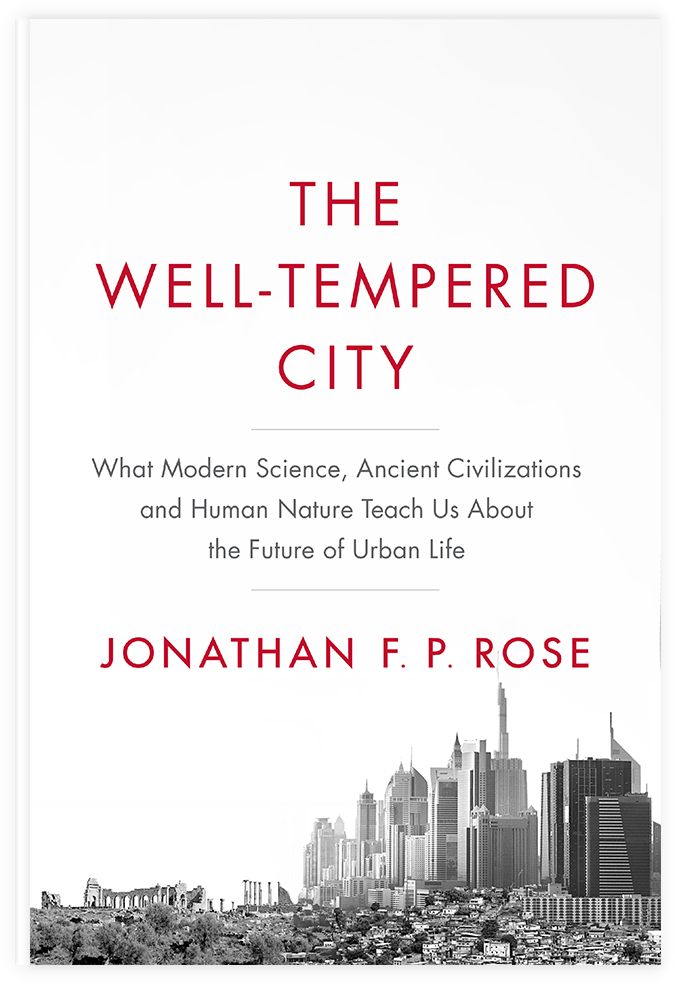DESIGN WITH NATURE: Renowned developer and urban thinker Jonathan Rose argues for new criteria for urban planning and development in his epic book ‘The Well-Tempered City’
Note to Reader:
Recognized for creating communities that literally heal both residents and neighborhoods, Jonathan Rose is one of the leading thinkers in the United States on the integration of environmental, social, and economic solutions to urban development issues facing the country today.
He is the founder of investment, development, and urban-planning firm Jonathan Rose Companies, and co-founder of the Garrison Institute. He was named a Metropolis Game Changer in 2014.
In The Well-Tempered City, published in September 2016, Rose distills a lifetime of interdisciplinary research and firsthand experience into a five-pronged model for how to design and reshape our cities with the goal of equalizing their landscape of opportunity.
Below are extracts from an article that Jonathan Rose wrote for Metropolis Magazine.

WATCH THE VIDEO (28 minutes): https://www.youtube.com/watch?v=TZRDvrUQH_A
The Well-Tempered City: How to Balance Prosperity and Equity
“I often read and write late into the night, pondering the issues of cities, how out of sync they are with nature and ourselves, and think about the shifts that could realign them—and I listen to Johann Sebastian Bach,” wrote Jonathan Rose.
“It came to me that the concept of temperament that helped Bach create harmony across scales could be a useful guide to composing cities that harmonize humans and nature.”
“I call this aspiration ‘the well-tempered city’. It integrates five qualities of temperament to increase urban adaptability in a way that balances prosperity and well-being with efficiency and equity, ever moving toward wholeness.”
A Five-Pronged Model
The first characteristic is coherence—moving from siloed strategies to integrated ones.
The second characteristic is circularity—moving from linear systems to connected ones.
The third characteristic is resilience—integrating climate resilience and cognitive resilience.
The fourth characteristic is community—recent science shows that the neighborhoods in which we live have an outsized effect on the quality of our lives, and the future of our children.
The fifth characteristic is compassion—when individuals try to maximize their own benefits, systems collapse.
An Epic Book, and Why
“I love epic stories with universal meaning for varied audiences around the world. In sum, that is why I think Jonathan F.P. Rose‘s new book will become a must-read classic. And, if 400-pagers are not your style, it’s at worst a well-written, must-browse wonder, with relevant lessons for us all,” wrote Chuck Wolfe in a book review. “Even those who prefer the short length of a tweet should immerse themselves in Rose’s ideas.”
 “Rose has done what many of us aspire to do, and translated experience into broad-based, focused lessons about the potential of our cities. He shows what we can achieve if we avoid discord, and align towards our latent human abilities to coordinate and mutually address inevitable change. After reading The Well-Tempered City, and speaking at length with Rose, I emerged with excitement and optimism”
“Rose has done what many of us aspire to do, and translated experience into broad-based, focused lessons about the potential of our cities. He shows what we can achieve if we avoid discord, and align towards our latent human abilities to coordinate and mutually address inevitable change. After reading The Well-Tempered City, and speaking at length with Rose, I emerged with excitement and optimism”
To Learn More:
Download The Well-Tempered City: How to Balance Prosperity and Equity to read the complete article by Jonathan Rose, published in the September 2016 issue of Metropolis Magazine.
Download Why ‘The Well-Tempered City’ is a One-Stop, Urban Epic to read the complete article written by Chuck Wolfe and published online by the Huffington Post in September 2016.


